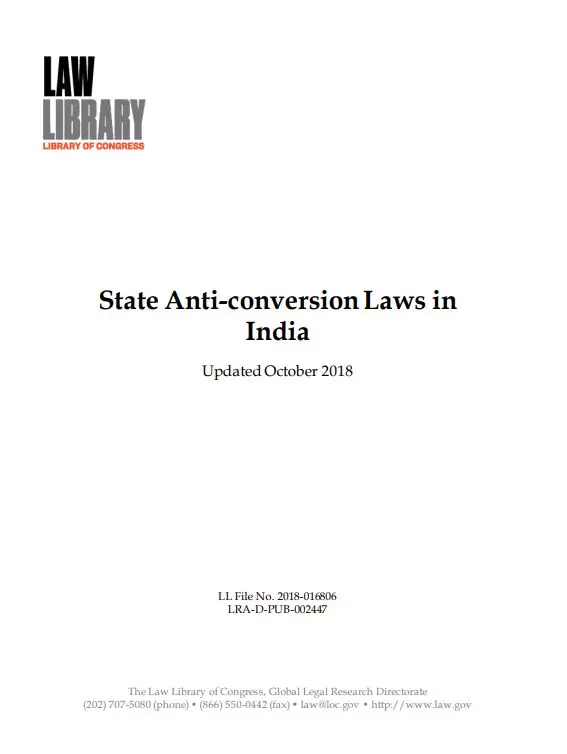‘State Anti-Conversion Laws In India’ PDF Quick download link is given at the bottom of this article. You can see the PDF demo, size of the PDF, page numbers, and direct download Free PDF of ‘State Anti-Conversion Laws In India’ using the download button.
State Anti-Conversion Laws In India PDF Free Download

State Anti-Conversion Laws In India
Contents
I. History of Anti-conversion Laws ……………………………………………………………………………………1
II. Overview of State Initiatives ………………………………………………………………………………………….3
III. Examination of State-Level Legislation …………………………………………………………………………4
A. Odisha (Formerly Orissa)………………………………………………………………………………………..4
B. Madhya Pradesh …………………………………………………………………………………………………….6
C. Arunachal Pradesh………………………………………………………………………………………………….8
D. Chhattisgarh ………………………………………………………………………………………………………..10
E. Gujarat ………………………………………………………………………………………………………………..11
F. Himachal Pradesh …………………………………………………………………………………………………12
G. Rajasthan ……………………………………………………………………………………………………………..14
H. Tamil Nadu …………………………………………………………………………………………………………14
I. Jharkhand ……………………………………………………………………………………………………………..15
J. Uttarakhand …………………………………………………………………………………………………………16
IV. Treatment by the Supreme Court ………………………………………………………………………………..18
V. Implementation and Enforcement ………………………………………………………………………………..20
A. Human Rights Concerns ……………………………………………………………………………………….20
B. Arrests and Convictions ……………………………………………………………………………………….21
Table: Elements of State Anti-conversion Laws ………………………………………………………………….23
Maps:
1: Status of State Anti-Conversion Laws in India ………………………………………………………….26
2: State Law Treatment of Re-Conversions in India ………………………………………………………27
3: Conversion Permission and Notice Requirements …………………………………………………….28
B. Madhya Pradesh
Madhya Pradesh was the second state to enact an anti-conversion law, the Madhya Pradesh Freedom of Religion Act, 1968.41 Instead of using the word “induction” in the Act, it has been used.
the word “inducement”, defined under section 2(a) as “the offer of any inducement” includes (i) any gift or gratification, either in cash or kind; (ii) grant of any material benefit monetary or otherwise.
”42 Section 3 of the Act states that “[n]ever shall convert or attempt to convert any person from one religious faith to another by force or inducement, whether directly or otherwise, nor shall any person incite any such conversion by any fraudulent means.
’43 The offense is punishable with imprisonment of either description for a term which may extend to one year, or with a fine which may extend to Rs.5,000, or with both.
44 If the offense is committed by a minor, a female is committed against, or for a person belonging to SC/ST, imprisonment for a term which may extend to two years and with a fine which may extend to Rs.10,000.
45 Under section 5 of the Act, a change of religion has to be reported to the District Magistrate religious priest or a person who converts any person
46 “within seven days from the date of such ceremony.”
47, Unlike the Orissa High Court, the Madhya Pradesh High Court in 1977 upheld the Madhya Pradesh Freedom of Religion Act, 1968 upheld, saying that the relevant sections “establish equality of.”
Religious freedom for all citizens by prohibiting objectionable activities like conversion by force, fraud, and inducement. One month before such conversion, “the particulars of the purification ceremony of the religion concerned in which such conversion takes place, the date, time, place and the name and address of the person whose religion is being converted.”
49 Failure to do so was punishable with imprisonment of up to one year, a fine of up to Rs 5,000, or both. In addition, the amendment will require a person who wants to convert to another religion to declare his intention to convert.
religion “[a]f the District Magistrate or [a]f the Executive Magistrate specially authorized by the District Magistrate of the district concerned, that he wishes to change his religion at his own will and pleasure.”
51 Failure to declare could attract a fine of Rs 1,000.
52 After receiving the information, the District Magistrate was to provide the details to the Superintendent of Police, who in turn would investigate the matter to ensure that there was no objection to it. Conversion
53 and reported their findings back to the District Magistrate.
54 However, the Governor of Madhya Pradesh, Balram Jakhar, sent the amendment bill to the President, who refused to assent to it as he felt it was “infringing on religious freedom”.
Guaranteed in the Constitution because it insists on prior permission.”
55 The Madhya Pradesh Assembly in August 2013 approved a similar amendment to the state’s 1968 anti-conversion law “that would make the law more stringent.”
56 According to a news report, the 2013 amendment makes forcible conversion punishable with imprisonment (up to three years and a fine of up to Rs 50,000, and up to four years and a fine in the case of a minor, a woman, or a person belonging to SC/ST 100,000), make it mandatory for the priest to request prior permission for the proposed conversion before the conversion, and require the person
| Language | English |
| No. of Pages | 32 |
| PDF Size | 0.06 MB |
| Category | Law |
| Source/Credits | – |
Related PDFs
Basic Engineering Mathematics 5th Edition PDF
AAI Recruitment 2023 Notification PDF
11th Tamil Guide 2023 To 2024 PDF
RAS Syllabus 2023 PDF In Hindi
KPSTA Swadesh Mega Quiz UP 2023 PDF
Pragjyotish College Prospectus PDF
Polling Agent Movement Sheet PDF
Agriculture Supervisor Syllabus 2023 PDF In Hindi
State Anti-Conversion Laws In India PDF Free Download
